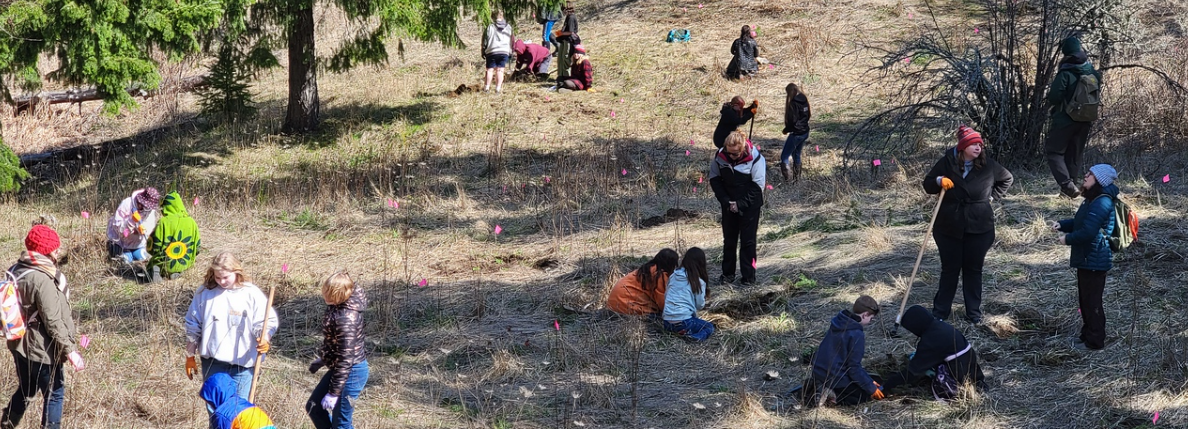In the midst of ongoing March snow and cold rain, for two days the clouds graciously parted as sixth- and seventh-grade students, teachers, and chaperones from Wind River Middle School in Carson, Washington, gathered with staff from Friends of the Columbia Gorge, U.S. Forest Service (USFS), and the Washington Dept. of Fish and Wildlife (WDFW) for a day of education and exploration on public lands adjacent to Friends’ Turtle Haven Preserve.
Partnering and visioning for this program began last spring when Wind River teachers sought opportunities to connect their students to outdoor learning on local public lands. Friends was fortunate to be awarded a National Forest Foundation grant that funds conservation education field trips to restoration sites in the Gorge. And after nearly a year of planning with partners, we were finally together on site!
Hands-on learning
WDFW biologists set the context for the day by giving an introduction to Western pond turtle conservation in the Gorge and sharing their experience rehabilitating populations in the area. They passed around turtle shells and other turtle specimens that allowed students to get a close-up view of animals that we normally enjoy from a safe distance.
For the rest of the four-hour program, students organized into small groups and rotated through hands-on activities, including a herpetology story and a biodiversity audit with USFS Park Rangers, and a wildflower planting session adjacent to the pond with Friends land trust and U.S. Forest Natural Resource staff. Sounds fun? It was a blast!
The herpetology story offered a deeper dive into the lifecycle of turtles and frogs, as well as the impact of the invasive American bullfrog on Western pond turtle populations. In a fun predator-prey game, the students were able to feel what it was like being a lonely Western pond turtle in a sea of predatory American bullfrogs. One student played the role of a Western pond turtle by trying to overcome long odds to evade (blindfolded!) all the other students acting as bullfrogs.
Next, the students participated in a biodiversity audit that introduced field science and data collection strategies. During the audit, students were taught to examine ecosystem details by taking inventory of as many plant and animal species as they could spot in a 10-by-10 plot of land. While at first glance one might see just a field of brown grass and trees, upon closer inspection students began to notice all the mosses, a ladybug on a leaf, plants with different kinds of thorns, and so much more. During lunch, one young budding botanist was especially proud to show off all the plants she had cataloged using Seek, an app created by iNaturalist that serves as an introductory learning tool for plant identification.
Promoting biodiversity

The students also took action to improve habitat around Collins Pond by planting around 500 wildflowers that will increase pollinator diversity within the meadows. The plants were grown from seed by students just downriver at Clark College Native Plant Center in Vancouver, and included a mix of self-heal, goldenrods, yarrow, and blanketflower. Students took breaks from planting to watch Western pond turtles basking on the logs in the adjacent pond.
When asked what was most fun about touring the area, one student responded, “how fresh it was and how there was so much to learn.” That pretty much sums it up: a gorgeous early spring day in the Gorge where students, teachers, and partners learned a lot, all in the company of basking turtles and the rhythmic chorus of Pacific tree frogs.
Sarah Skelly is Friends' volunteer coordinator. For the past ten years, Sarah served in various roles on Tualatin Hills Park and Recreation District Nature & Trails team, managing small habitat enhancement projects, teaching nature based activities, and leading habitat and trails stewardship programs with schools, businesses, and community groups. In previous years, Sarah worked as an instructor with the Columbia Estuary Partnership, exploring Columbia Basin watersheds with youth, including Steigerwald Wildlife Refuge.
Sarah has also been an active volunteer with Friends of Trees and is a dedicated community scientist who has spent winters in ponds counting egg masses with Metro and springs in woodlands counting birds with Portland Audubon. Her favorite moments working with volunteers are all the little surprises and teachable moments nature reveals while pulling weeds, planting trees, or repairing trails. In 2020, Sarah relocated to the east Gorge, where she spends most of her free time exploring rivers and trails with her family.


